SWITZERLAND
Bern

Bern
Bern
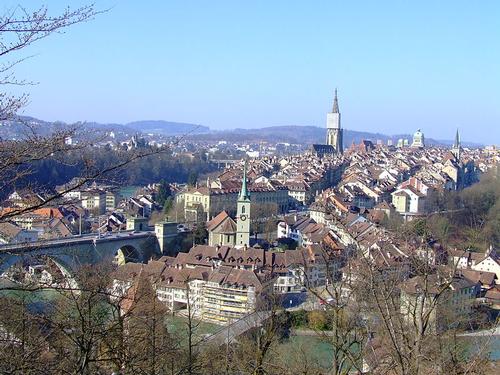 Bern Inner CityPhoto: Public Domain
Bern Inner CityPhoto: Public Domain
The slogan "small, but nice" is perfect for Bern, Switzerland's federal city. Bern has an area of just over 51 km². The city has about 140,000 inhabitants. Bern is internationally recognized as a city with a rich culture. Especially the historic buildings that Bern is full of are well known.
Switzerland does not have an official capital, because the country does not want to appoint a city as an economic and centralistic center. The name federal state means that the board of the federation and the government are located in Bern. What is striking about this Swiss federal city is that Bern, unlike most European capitals, is not the largest city in the country. In fact, Bern is Switzerland's fourth largest city and is preceded by Zurich, Geneva and Basel.
Location
Bern is located in northwestern Switzerland at 540 meters above sea level. The city is located in a valley of the Schweizer Mittelland, a plateau mountain range. The historic part of the city is located on a bend in the river Aare. The newer city districts are often connected to this by bridges.
The canton of the same name to which Bern belongs has an area of 5,959 km². In the south of this canton are the Bernese Alps where one of the highest peaks in Europe, the Jungfrau, is located.
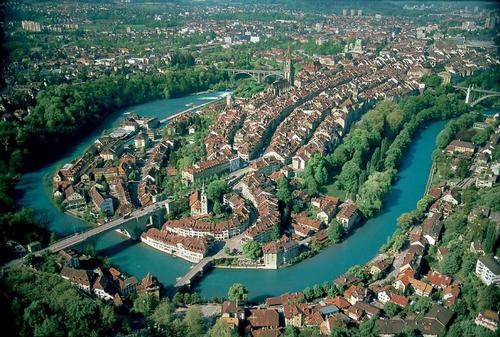 Bern, SwitserlandPhoto: Publid Domain
Bern, SwitserlandPhoto: Publid Domain
Weather
Switzerland has a total of four climates. This is caused by the large height differences within the land and the sea. The city of Bern has a maritime climate influenced by the relatively high location of the city. December and January are the coldest months in Bern, during these months snow can also fall in the city. It is warmest in June, July and August. Below are the average temperatures in Bern per month.
January: -1 ° C
February: 0.5 ° C
March: 3.5 ° C
April: 7.5 ° C
May: 11.5 ° C
June: 15 ° C
July: 17 ° C
August: 16.5 ° C
September: 13.5 ° C
October: 9 ° C
November: 4 ° C
December: 0 ° C
History
Bern owes its name to a Swiss legend. Bern is a corruption of the German word for bear "Bär". The city's origins lie in the settlement that was founded in 1191 by Duke Berchtold V. The legend goes that this Duke killed a bear at the place where Bern is now located. The bear is still the symbol of the city; everywhere in Bern you come across wooden, plush and even chocolate bears.
A period of steady growth followed in the 14th century and it was not long before Bern came into conflict with nearby Freiburg. Bern was victorious in his first major battle. With a newfound confidence and strength, Bern recovered and it wasn't long before Bern became the largest and most important city-state on the north side of the Alps.
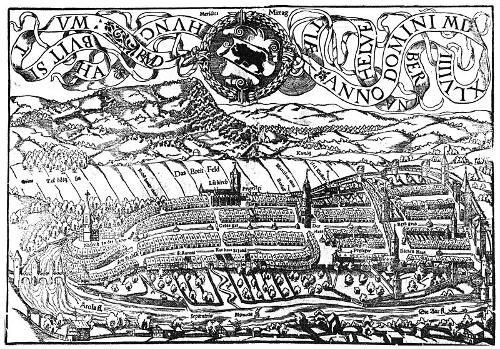 Bern in 1549Photo: Public Domain
Bern in 1549Photo: Public Domain
In the 16th century the guilds emerged and the city began to produce the famous Bernese glass paintings, which were very popular.
The French Revolutionary Wars of the late 18th century took their toll. By the early 19th century, the population had grown to 12,000 and steadily grew to 60,000 at the beginning of the 20th century. Switzerland remained neutral during the First World War (1914-1918) and at the end of the war, Bern had 100,000 inhabitants.
When World War II (1939-1945) broke out, Switzerland was soon surrounded by fascist troops from Austria, Germany and also Italy. Although Switzerland managed to remain neutral, this was a difficult time in Bern's history. Declining trade and cooperation with Hitler created a black page in the history of Bern.
Sights
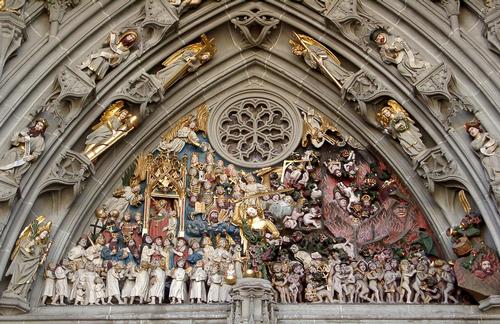 Münster Cathedral, BernPhoto:Mueffi CC 3.0 Unported no changes made
Münster Cathedral, BernPhoto:Mueffi CC 3.0 Unported no changes made
There are many impressive old buildings in Bern. Take the gothic Münster cathedral, for example, built between 1421 and 1893. The tower of the cathedral was the last part of the church to be completed and is the highest in the city at 100 meters. The tower can be climbed via 254 steps, the view you have from the tower is breathtaking. From the tower you can even see the Alps. The stained glass windows and the rich carvings immediately catch the eye when you visit the Münster cathedral. The Münster cathedral also houses one of the few sculpture collections that survived the Iconoclasm in Bern. The images depicting the Day of Judgment attract many visitors.
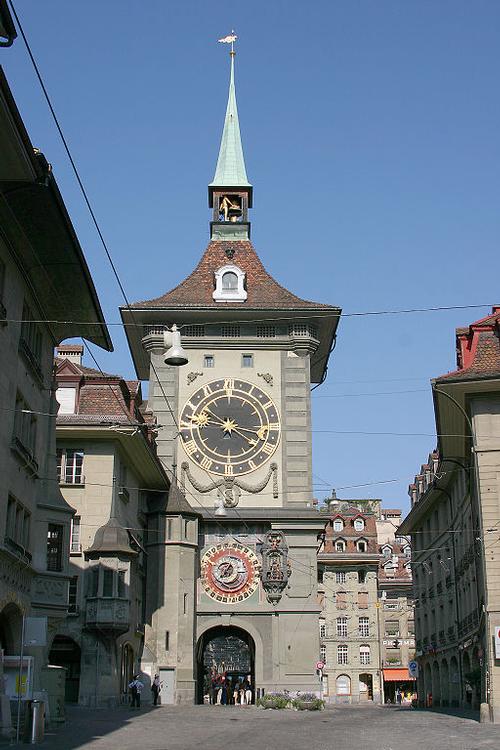 Bern ZytgloggePhoto: Mike Lehmann CC 3.0 Unported no changes made
Bern ZytgloggePhoto: Mike Lehmann CC 3.0 Unported no changes made
The Clock Tower (Zytglogge) was Bern's first city port. The tower is located in the heart of the old town, where it is one of the most loved sights and tourist attractions. An astronomical clock can be seen at the top of the tower. Throughout the day you can hear the chimes every hour and if you have time you can take a guided tour to get a close-up view of this historic timepiece.
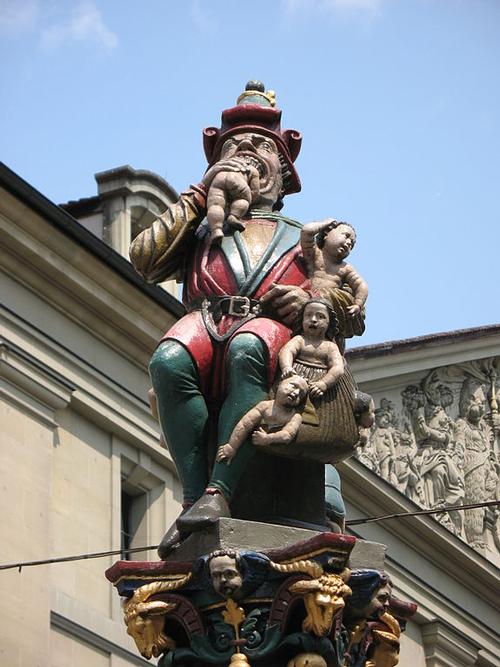 Chindlifrässer fountain, BernPhoto: Andrew Bossi CC 2.5 Genericno changes made
Chindlifrässer fountain, BernPhoto: Andrew Bossi CC 2.5 Genericno changes made
More than 100 fountains can be found in Bern. Swiss heroes and famous historical events are often the theme of the fountains. Fountains from different periods can be found all over the city, there are even fountains from the 16th century. For example, there is a fountain with Lady Justice on it. The water fountain depicting the "Chindlifrässer" is characterized by many as the most beautiful fountain in Bern. The Chindlifrässer is an ogre who would eat small children. The fountain is famous for its beautiful details and design. This fountain can be found in the old part of Bern.
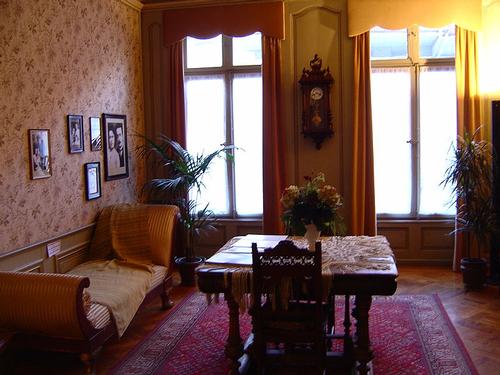 Living room in the Einsteinhaus, Bern SwitserlandPhoto: N 2100 CC 3.0 Unported no changes made
Living room in the Einsteinhaus, Bern SwitserlandPhoto: N 2100 CC 3.0 Unported no changes made
The Einsteinhuis is a small apartment consisting of three cramped rooms, but it is of enormous historical significance and a special attraction. It was in this place where, in 1905, the world-renowned Nobel Prize winner Albert Einstein (1879-1955) developed his legendary theory of relativity. Visitors often find it very fascinating to imagine how Einstein would sit at his desk.
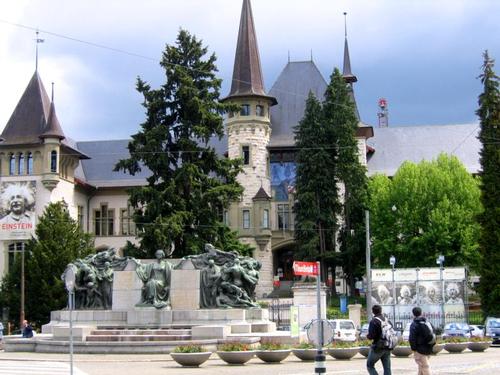 History Museum BernPhoto: Public Domain
History Museum BernPhoto: Public Domain
The Bern History Museum was built in 1894 and was originally intended to house the Swiss National Museum (Landesmuseum). The architecture of the historical museum in Bern is inspired by classical 15th century architecture and various fortresses from that time. Following a substantial donation by the Abegg Foundation, the museum has recently been expanded, with a spacious exhibition space. Many displays recall the life and contributions of the German physicist Albert Einstein, who spent many years in Bern.
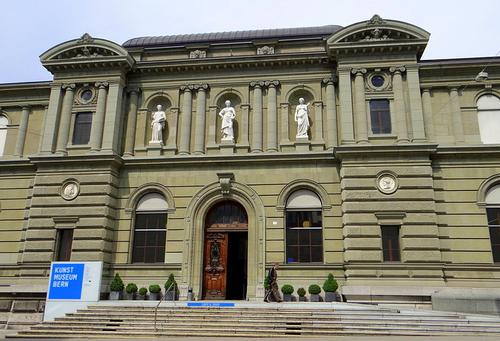 Museum of fine arts in BernPhoto: Geri340 CC 3.0 Unported no changes made
Museum of fine arts in BernPhoto: Geri340 CC 3.0 Unported no changes made
The Museum of Fine Arts is a special museum for many in Bern and it is located on Hodlerstrasse. A visit to the art museum is highly recommended to anyone with the slightest interest in art. The paintings of famous artists provide a special experience. The biggest draw are the 2,000 works of art created by the Swiss painter Paul Klee. Of course, not all of these works are shown, but they change regularly.
Tips
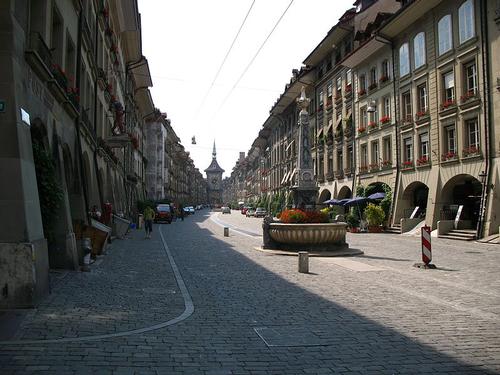 Arcades in BernPhoto: Andrew Bossi CC 2.5 Generic no changes made
Arcades in BernPhoto: Andrew Bossi CC 2.5 Generic no changes made
Shopping is best in the old city center. Bern has 6 kilometers of arcades and therefore has one of the longest covered shopping promenades in Europe. Under the arcades and on squares and side streets are dozens of restaurants and cafes where you can rest. You will find all kinds of shops: antique shops, book shops, jewelers, perfumery, sports shops and many trendy clothing shops. On Tuesday and Saturday mornings you can find colorful markets for fresh vegetables, flowers and meat here. Bern is also known for its watches and chocolate.
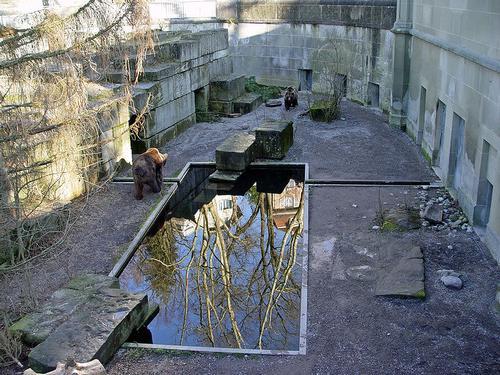 Bears in the Dählhölzli zoo in BernPhoto: Yesuitus2001 on de.wikipedia.org CC 2.5 no changes made
Bears in the Dählhölzli zoo in BernPhoto: Yesuitus2001 on de.wikipedia.org CC 2.5 no changes made
Because the bear is the trademark of Bern, you can take a look at the bear pit in the Dählhölzli zoo. Groups of brown bears have been living here since the opening in 1850. The enclosures of the bears have recently been expanded and stretch down to the river.
Useful links Bern
BBC Country ProfilesWorld Fact Book Explore all Countries
How to call
Last updated January 2026
Copyright: Team - The World of Info